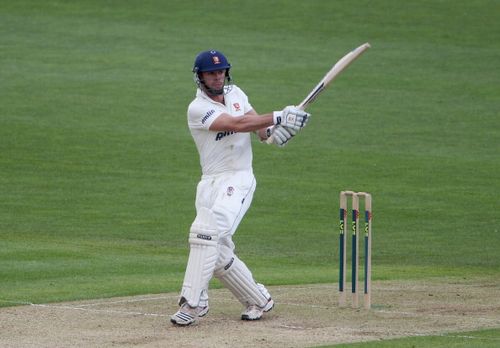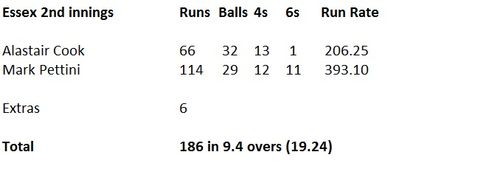
Contrived cricket - The more legitimate form of 'match-fixing'
Did you know that English cricketer Mark Pettini scored 114 runs off just 29 balls?

Mark Pettini – the scorer of 114 runs in 29 balls
Here’s a recap of some extraordinary events for viewers unfamiliar with county cricket.
It was a second division match between Essex and Leicestershire at Grace Road, Leicestershire in 2006 and Essex needed a win to get promoted to the top division. Nothing less than a victory would have done it for them.
But on stumps at Day 3 in this four-day match, the hosts were 290/4 in their first innings, 196 runs behind Essex’s first innings total of 486. Once two of their batsmen completed centuries, Leicestershire declared at 372/4.
In this situation, the match was as good as over for Essex. There was no chance of a victory and subsequent qualification to the top league.
But then, something weird happened. Essex scored 186 runs in the 2nd innings off just 9.4 overs, at a run rate of 19.24!
Alastair Cook scored 66 off 32 balls and Mark Pettini collected 114 runs from the 29 balls he faced, striking 11 sixes and 12 fours in the innings.
It’s a bit hard to believe that this actually happened. Here’s the scorecard.

But Mark Pettini isn’t the scorer of the fastest century in cricket’s history. Because the 3rd innings of this match was a pre-planned effort by both teams to achieve a result in the game.
The term here is ‘contrived cricket’.
The captains of both sides, Essex’s Ronnie Irani and Leicestershire’s Darren Robinson decided that to achieve a ‘fair’ result, Leicestershire would deploy its two worst bowlers, Paul Nixon and the skipper himself, to bowl utter rubbish to the Essex batsmen.
Full tosses down the leg side and loopy deliveries ensued as the Essex duo of Pettini and the current English captain, Cook, made a mockery of cricket records.
The hosts were finally given a target of 301 off 65 overs, which they achieved, this time, cricket being played in its normal competitive form.
However shocking it may be for someone unfamiliar with county cricket, especially its lower rung, it’s supposedly quite a common occurrence in England.
The records which are made under these ‘manufactured’ circumstances, are relegated to a footnote in Wisden records, separated from the ones achieved in proper competitive conditions.
How is it not blatant match-fixing then?
That’s the first question that comes to mind when thinking of results which were contrived in county cricket. The only reason they aren’t illegal, at least in the lower leagues, is because at the end of the day, both teams try to win the game, rather than concede an easy victory to the opposition.
In the days of 3-day cricket and matches hampered by rain, it was common for captains to reach an understanding of what a ‘fair’ target would be for both the teams in the final innings, thereby still keeping the window open for a result in the game.
Such matches, whether List A or First Class, aren’t always stripped of their status, but any records, such as Pettini’s 24-minute, 29-ball innings, aren’t included in other ‘legitimate’ record lists, and merely relegated to the status of footnotes.
The interesting thing here is that though being common in English leagues, the acceptance hasn’t been so widespread in other nations for such results. For example, in 1989, Geoff Lawson and David Hookes found themselves in the middle of a controversy when a similar attempt to achieve a contrived result was made.
However, despite reaching an agreement over the phone, Lawson preferred to take the points from a first innings lead in Sheffield Shield, angering Hookes to much extent.
Even as late as last year, England found themselves chasing a contrived target against England Lions in a preparation match at Abu Dhabi before taking on Pakistan in an ODI series in UAE. Having bowled out England Lions for just 96, everyone agreed that a more competitive target of 231 in 50 overs would do much good to England’s preparations.
Interesting as it is, the whole process is quite ironical when a pre-planned uncompetitive effort in the field is needed to bring out a ‘fair’ result in the game.
However, with promotion and relegation on the line and with the other team not losing much out of it, it’s considered acceptable in many circles, looking at the big picture, irrespective of the petty means used to achieve it.